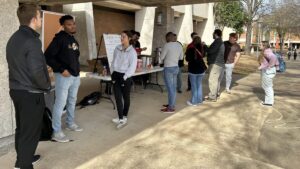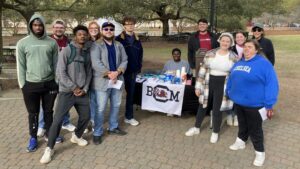My parents warned me about college: “It’s not like high school, and it’s certainly not like youth group. It’s the real world. Not everyone is your friend.”
I understand and appreciate what they told me. I did need to be careful.
College often comes with unprecedented freedom and unexpected interactions. You meet people of all kinds of beliefs and backgrounds, many of them very different than your own.
With those things in mind, I remember cautiously stepping onto campus anticipating my first encounter with a heathen collegian.
I’m not the only one who has ever made assumptions about unbelievers.
As far as I know, Abraham (the one we meet in the book of Genesis) didn’t go to college. His parents likely didn’t prepare him to navigate the evils of campus culture or withstand antagonistic philosophy professors.
Despite never receiving the talk about the dangers of college, somehow Abraham was aware of the “real” world’s reputation.
After he leaves home, away from the security of everything he has ever known, Abraham soon finds himself in the real world of Egypt.
He’s not even officially “Abraham” yet, but he’s been around long enough to know about guys like Pharaoh. The patriarch assumes that his chances of survival in Egypt are bleak with a wife as beautiful as Sarai.
As they prepare to enter the idolatrous nation, our great hero of the faith concocts a faithless plan (it won’t be the last time) to trick Pharaoh into believing that he and Sarai are not married.
They come to Egypt, and, right on cue, Pharaoh summons Sarai. She heads to the palace while Abraham’s life is spared.
Whether or not Abraham even had a next step in mind for his plan, God quickly proves faithful to His promises.
On Sarai’s behalf, He strikes Pharaoh’s household with plagues. The news gets around to Pharaoh that these plagues are connected to the fact that Sarai and Abraham are actually married. If the predictions prove true, now that their marriage is known, Abraham is a dead man walking.
Good thing Abraham wasn’t much of a prophet during his early years. Instead of killing her husband, Pharaoh returns Sarai safely to Abraham and asks the obvious question: “Why didn’t you just tell me that she’s your wife?”
Thankfully, Pharaoh didn’t quite live up to Abraham’s expectations. This pharaoh wasn’t the heinous ruler he’d imagined him to be.
The truth is that most people on a college campus aren’t bloodthirsty monsters. You’ll meet a handful of unbelievers in college who might attack your belief in God and confirm your assumptions about the depravity of sinners.
However, the majority of your interactions with others will likely prove thoroughly cordial.
Sometimes when you expect to meet Moses’ pharaoh, instead you meet Abraham’s pharaoh. Rather than a deceitful, selfish, murderous unbeliever, you come across someone who, although isn’t a worshipper of Jesus, isn’t as bad as you thought.
Here’s my plea: don’t miss the opportunity.
The danger of the mostly moral, genuinely friendly unbeliever isn’t that they might kill you and take your valuables (like Abraham’s concern). I would argue, however, authentic friendships with non-Christians present an even greater danger: the danger of complacency.
Complacency occurs when our hearts harden towards unbelief and our commitment to evangelism softens. We find ourselves satisfied simply with the fact that a person is kind to us. Our contentment with the status quo makes us reluctant to say or do anything that might disrupt the relationship.
The danger of complacency leaves us disobedient to the commission of Christ and our friends unaware of the Gospel of Christ.
Just to make sure I’m not being misunderstood: I am not saying, “Stay away from unbelievers!” In fact, I’m constantly asking my students and myself, “Have you isolated yourself from non-Christians?”
How will the campus hear the Gospel if we never break out of our Christian circles?
Instead, consider this an appeal: When you do find yourself on campus with a new, unbelieving friend, not to fall into complacency.
Don’t be surprised to find quite a few of your non-Christian classmates living with decency. We should be grateful that the Lord shows His common grace by restraining evil in the present age.
Although a fair share of the morals of Christianity are deeply embedded within our society, the God of Christianity remains largely rejected.
Recognize the fact that God has opened a door for you to make the love of Christ known to someone who, even though they might be a genuinely great friend, still needs the grace of God offered through the Cross.
State Missionary Jacob Freeman serves as campus minister at the University of Montevallo.



